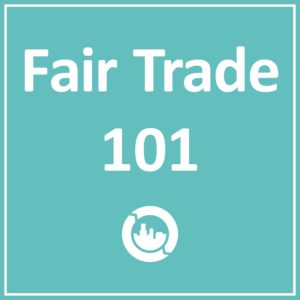Day 6 at COOPROBATA: Banana’s that protect the people and preserve the planet
In March, Fair Trade Towns USA sent 12 volunteer organizers on a 7 day learning tour of Fair Trade farms in Dominican Republic. The travelers came from town and city campaigns all over the country to see the effects of their hard work visiting cocoa, coffee and banana farms, as well as a sweat-free apparel factory. This series chronicles the trip through the eyes of a different organizer each day.
This blog post comes to us from Lisa Dunaway of Fair Trade Winter Park
COOPROBATA Background:
On our final day in the Dominican Republic, the delegation visited COOPPROBATA, a Fair Trade banana cooperative in Azua. This was everyone’s first visit to a banana farm and we had no prior expectations.
When our weary, yet enthusiastic group arrived at the COOPPROBATA offices, we were greeted warmly by several members of the group including: Jorge, the General Manager, Production Manager Luis De La Cruz, Alcedo Beitro of the Technical Assistance Program and Jose Gomez, an engineer in the Certification and Quality Compliance Department. We were welcomed into the bright green building, which was recently purchased by the cooperative, and then guided outside to the backyard where we formed a circle and began our meeting and under the shade of a mango tree.
We started with introductions and then Jorge told us about the history and current state of COOPPROBATA. The cooperative was started in 1994 with 162 producers. From the very beginning, the group cultivated their bananas organically, using no harmful chemicals or pesticides. In 1994 they became Fair Trade Certified and began a series of annual programs to benefit their community. So far, Fair Trade social premiums have allowed COOPPROBATA to fund scholarships for seven students, literacy programs, and educational campaigns in gender equality and anti- child labor. COOPPROBATA has also used the Fair Trade social premiums to pay for necessary surgeries for producer members and members of their local community.
In addition, the cooperative has created environmental campaigns to educate the community about reducing waste, conservation and reduction in deforestation. The leaders of the cooperative feel very strongly about organic cultivation. They reiterated to the group that organic farming protects the people and preserves the planet.
Currently, COOPPROBATA exports bananas only to Europe. Sadly, there is not enough of a demand for Fair Trade or even organic bananas in the United States. Members of the cooperative believe that more education is needed in the United States about the importance of how Fair Trade standards benefit farming for several reasons. For example, there is a myth that organic farming is not necessary for bananas because the thick peel protects the fruit from the harmful chemicals. However, when pesticides are used, they are absorbed into the soil and the roots of the trees, which are the source of nutrients to the fruit. More importantly, harmful pesticides are the cause of severe illness to the producers who work in the fields everyday.
Worker Safety & Pride at COOPROBATA Make for Quality Bananas:
The producers of COOPPROBATA take pride in the safe working conditions for their producers and all of the workers in the processing plant. As we toured the facility and the banana farm we saw safety posters throughout. There were even safety posters attached to trees, deep in the farm to remind workers of the emergency procedures.
The farmers have a profound pride in the quality of their bananas. We were carefully guided through the entire process of production, from the beginning when the fruit is just a flower on the tree, to the sorting and cleaning process, all the way to the final fruits being loaded on a refrigeration truck that transports the bananas to the export locations.
Throughout the entire process, our guides explained that quality is very important to their cooperative.
As we prepared to leave, Jose Gomez thanked us for our visit and explained to us that visitors such as our Fair Trade Towns delegation help them and the growers realize that their hard work and sacrifices are being appreciated. Our interest and support help keep them motivated while the Fair Trade market enables them to grow their communities and improve the overall well being of their producers and communities. They believe that only conscience consumers will help this movement grow and encouraged us to visit again.







You must log in to join the discussion. If you are not already a member registering is easy.